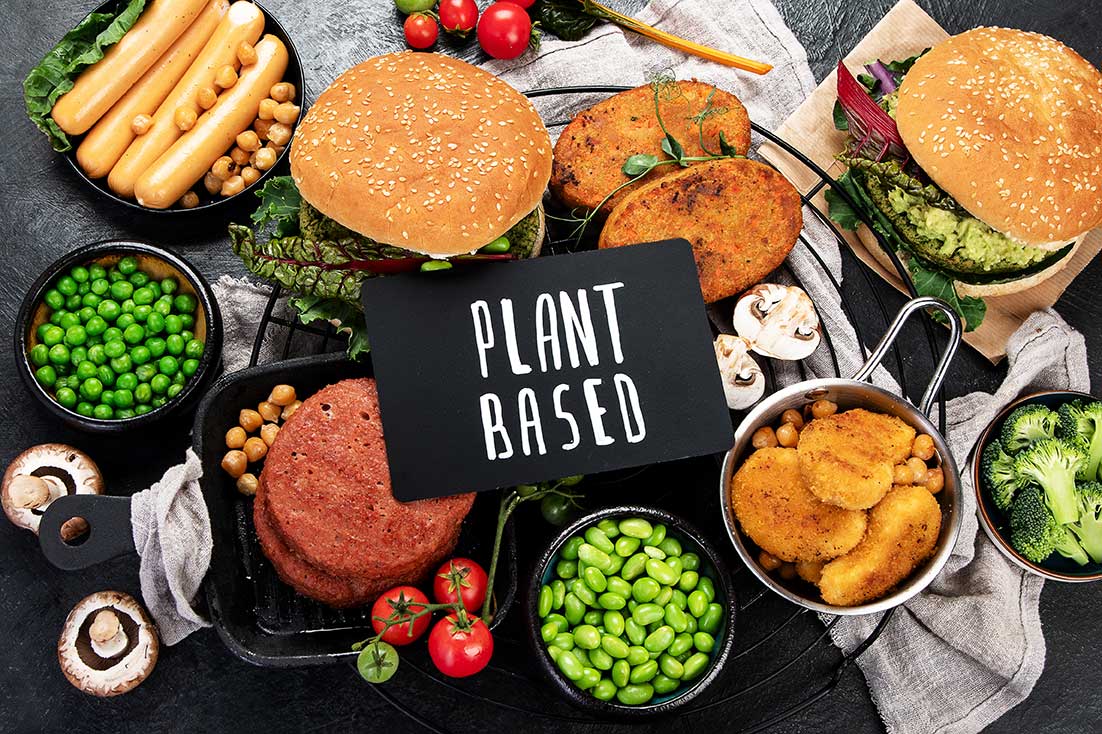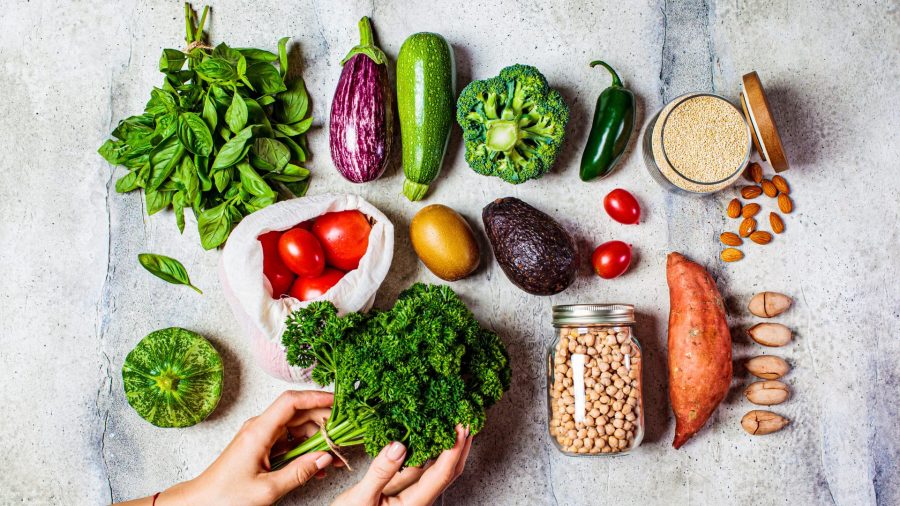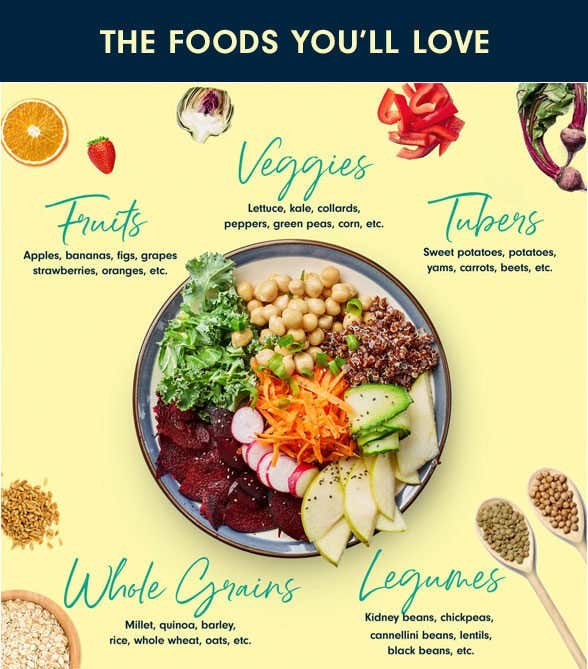How to Make Gluten Free BBQ Sauce from Scratch: A Step-by-Step Tutorial
How to Make Gluten Free BBQ Sauce from Scratch: A Step-by-Step Tutorial
Blog Article
Everything About Healthy And Balanced Food: Benefits of Embracing Plant Based Choices
The conversation bordering plant-based diet plans has actually gotten significant interest over the last few years. Numerous individuals are discovering the prospective health and wellness advantages, dietary benefits, and ecological effects connected with these dietary selections. As individuals end up being extra aware of their food's impact on health and sustainability, concerns occur regarding the practicalities of adopting such a way of living. What particular adjustments can one anticipate, and just how might these selections improve not just personal health and wellness however likewise the earth's future?
Comprehending Plant-Based Diet Regimens
Although lots of people connect plant-based diet plans primarily with vegetarianism or veganism, these diet plans can include a wide variety of eating patterns that prioritize whole, minimally refined plant foods. Such diets frequently include fruits, vegetables, whole grains, nuts, seeds, and beans, while eliminating or limiting animal items. This flexibility permits people to customize their nutritional choices according to personal choices and nutritional requirements. Some may adopt a mainly plant-based diet while still periodically consuming meat or dairy, usually described as a flexitarian technique. The focus remains on incorporating more plant foods, which can result in a diverse selection of flavors and dishes. Recognizing these various interpretations of plant-based eating is vital for appreciating its accessibility and charm in modern food society.
Health And Wellness Advantages of Plant-Based Foods
The health benefits of plant-based foods are significant, using a nutrient density advantage that sustains total health. Study shows that these foods can enhance heart health and wellness and play a crucial duty in effective weight administration. By integrating a lot more plant-based choices, people might improve their nutritional selections and promote lasting health.
Nutrient Thickness Benefit
Nutrient density plays a crucial duty in the health advantages of plant-based foods, making them an engaging selection for those looking for a balanced diet plan. Plant-based foods, such as fruits, vegetables, beans, nuts, and entire grains, are commonly rich in vital vitamins, minerals, and antioxidants while being lower in calories. This high nutrient thickness allows individuals to consume fewer calories while still satisfying their nutritional demands. Furthermore, these foods are loaded with nutritional fiber, promoting digestive system health and aiding in weight administration. By including nutrient-dense plant-based alternatives, customers can enhance their total wellness, support their immune systems, and reduce the threat of chronic conditions. Ultimately, the nutrient thickness of plant-based foods emphasizes their value in a health-conscious way of life.
Heart Health And Wellness Enhancement

Weight Management Support
In addition to promoting heart health and wellness, a plant-based diet plan can substantially help in weight monitoring. This nutritional approach highlights whole foods such as fruits, vegetables, beans, nuts, and entire grains, which are typically reduced in calories and higher in fiber contrasted to animal-based items. The high fiber material assists boost satiety, lowering overall calorie intake. Plant-based diets are often rich in important nutrients while reduced in undesirable fats, making it simpler to keep a healthy weight. Research suggests that people that embrace a plant-based lifestyle tend to have lower body mass indexes (BMIs) and experience more effective weight loss compared to those who take in meat-heavy diets. Subsequently, welcoming plant-based alternatives is a strategic choice for reliable weight administration
Nutritional Worth of Plant-Based Active Ingredients
Plant-based ingredients are abundant in essential nutrients, offering a diverse variety of vitamins, minerals, and anti-oxidants that add to general wellness. A contrast of healthy protein resources discloses that while pet items are usually seen as superior, numerous plant-based options supply adequate healthy protein and various other useful compounds. Recognizing the dietary value of these ingredients can help people make educated dietary options.
Crucial Nutrients in Plants
Nutrient-rich active ingredients discovered in plants provide a diverse variety of necessary nutrients that add significantly to general health and wellness. These ingredients are rich in vitamins A, C, and K, which support immune feature, vision, and blood clot, respectively. On top of that, plants offer crucial minerals such as calcium, potassium, and magnesium, essential for heart health, muscle feature, and bone stamina. The existence of fiber in plant-based foods help digestion and advertises a healthy intestine microbiome. Antioxidants, located generously in vegetables and fruits, help battle oxidative anxiety and reduce inflammation. Lots of plant foods are reduced in calories yet high in nutrients, making them an exceptional option for those seeking to preserve a healthy weight while guaranteeing suitable nutrient consumption.

Contrasting Protein Sources
Healthy protein sources vary considerably in their nutritional accounts, with plant-based components using special advantages. Unlike animal proteins, which often have hydrogenated fats and cholesterol, plant healthy proteins have a tendency to be lower in these unhealthy components. Legumes, nuts, seeds, and whole grains are abundant in necessary amino acids, fiber, vitamins, and minerals. Lentils supply high healthy protein web content along with considerable iron and folate, while quinoa is a complete healthy protein, supplying all 9 important amino acids. Additionally, plant-based healthy proteins are usually come with by anti-oxidants and phytochemicals that support overall wellness. The change to plant-based protein sources not only boosts dietary consumption yet additionally aligns with sustainable dietary methods, lowering ecological influence and promoting long-lasting health and wellness advantages.
Environmental Effect of Plant-Based Consuming
As awareness of environment change expands, several people are checking out lasting nutritional selections that can significantly reduce their ecological footprint. Plant-based eating has become a substantial factor to minimizing greenhouse gas discharges, which are mostly linked with livestock manufacturing. The cultivation of fruits, veggies, grains, and vegetables normally calls for less sources, such as water and land, contrasted to animal farming. Furthermore, plant-based diets can result in decreased logging, as less land is needed for grazing livestock or expanding pet feed. By shifting towards plant-based alternatives, customers can sustain biodiversity and advertise much healthier environments. Overall, accepting plant-based consuming not only advantages personal health however additionally stands for a vital step look at here now toward ecological sustainability why not look here and preservation efforts.
Conquering Common Misconceptions
While lots of people acknowledge the advantages of a plant-based diet regimen, a number of misconceptions commonly hinder them from completely accepting this way of living. A common belief is that plant-based diet plans lack sufficient healthy protein; nonetheless, various plant resources, such as vegetables, nuts, and tofu, provide adequate protein. Additionally, some assume that this diet regimen is pricey, when as a matter of fact, staples like beans, rice, and seasonal veggies can be rather inexpensive. Another mistaken belief is that plant-based eating is excessively limiting, whereas it really supplies a diverse array of flavors and foods. Many fret that a plant-based diet regimen might lead to shortages, yet with appropriate preparation, individuals can acquire all necessary nutrients, consisting of minerals and vitamins, while taking pleasure in a wide selection of scrumptious dishes. Vast Tips for Transitioning to a Plant-Based Way of life
Making the shift to a plant-based lifestyle can be an enriching experience, though it often needs some guidance to navigate the preliminary changes. Individuals are motivated to start slowly, including even more fruits, vegetables, vegetables, and whole grains into their meals while reducing meat and dairy products usage. Dish preparation is crucial; preparing a regular food selection can assist alleviate the adjustment and avoid final unhealthy selections. Checking out brand-new recipes and cooking techniques can also boost the experience and keep exhilaration about plant-based consuming. Furthermore, joining support groups or communities can supply inspiration and share useful tips. Remaining educated concerning nourishment guarantees balanced meals, protecting against deficiencies while cultivating a healthy, enjoyable plant-based way of living.

Delicious Plant-Based Meal Ideas
Checking out delicious plant-based meal ideas can motivate individuals to embrace a much more nourishing diet plan. One popular choice is a passionate quinoa salad, featuring cherry tomatoes, cucumber, and a tangy lemon-tahini clothing. Another favorite is a savory lentil stew, packed with carrots, celery, and great smelling natural herbs, excellent for a calming supper. For breakfast, over night oats made with almond milk, chia seeds, and topped with fresh berries provide a nutritious begin to the day. Additionally, a lively veggie stir-fry with tofu and a variety of colorful veggies can be a fast yet pleasing dish. Velvety avocado toast on whole-grain bread, sprayed with flavors and seeds, supplies a straightforward yet delicious snack. These meals display the selection and richness of plant-based consuming.

Frequently Asked Inquiries
Can a Plant-Based Diet Supply Enough Protein?
The inquiry of whether a plant-based diet regimen can give sufficient healthy protein prevails. Various resources, consisting of beans, nuts, seeds, and whole grains, can fulfill healthy protein requires properly, supporting a nourishing and balanced diet for individuals.
Are Plant-Based Diets Appropriate for Children?
The suitability of plant-based diets for youngsters relies on mindful planning. Appropriate nutrients have to be ensured, consisting of proteins, minerals, and vitamins. With appropriate support, such diet regimens can sustain healthy development and advancement in kids.
How Do I Eat in restaurants on a Plant-Based Diet?
Eating in restaurants on a plant-based diet entails looking for restaurants with diverse food selections, requesting for adjustments, and discovering vegan-friendly alternatives. Preparation in advance and communicating nutritional preferences can find out here now boost the eating experience while maintaining dietary selections.
What Are Usual Allergens in Plant-Based Foods?
Common irritants in plant-based foods consist of soy, gluten, nuts, and seeds - Sugar Free Sauces. Individuals adhering to a plant-based diet must recognize these allergens and review tags very carefully to prevent adverse reactions and guarantee risk-free intake
Can Plant-Based Diets Aid With Weight Reduction?
Research study indicates that embracing a plant-based diet may help with fat burning due to its typically reduced calorie thickness and greater fiber web content. This combination can enhance satiation, helping individuals handle their caloric intake properly. Numerous people connect plant-based diet regimens mostly with vegetarianism or veganism, these diets can incorporate a broad variety of eating patterns that focus on entire, minimally refined plant foods. Nutrient thickness plays a crucial role in the wellness benefits of plant-based foods, making them a compelling selection for those seeking a well balanced diet. Plant-based diet plans have been shown to substantially boost heart health, as they usually include components that sustain cardio feature. In addition to advertising heart health and wellness, a plant-based diet plan can substantially help in weight administration. An usual idea is that plant-based diets lack sufficient healthy protein; nonetheless, countless plant sources, such as vegetables, nuts, and tofu, provide sufficient healthy protein.
Report this page